Business Law Case Study: Breach of Contract and Liability
VerifiedAdded on 2022/11/10
|10
|2460
|128
Case Study
AI Summary
This case study analyzes two legal issues: breach of contract and corporate liability. The first issue concerns Michael's liability for a breach of contract with WA Lithium Refineries Pty Ltd, examining the application of the Corporations Act 2001 regarding pre-registration contracts and ratification. The second issue evaluates Michael's responsibility for $250,000 owed to AES Ltd, addressing contract breaches after company registration. The case explores legal principles such as the lifting of the corporate veil and ostensible authority, examining the responsibilities of directors and officers. The analysis uses the ILAC format to provide legal reasoning and conclusions for each issue, with a focus on contract law and corporate liability.
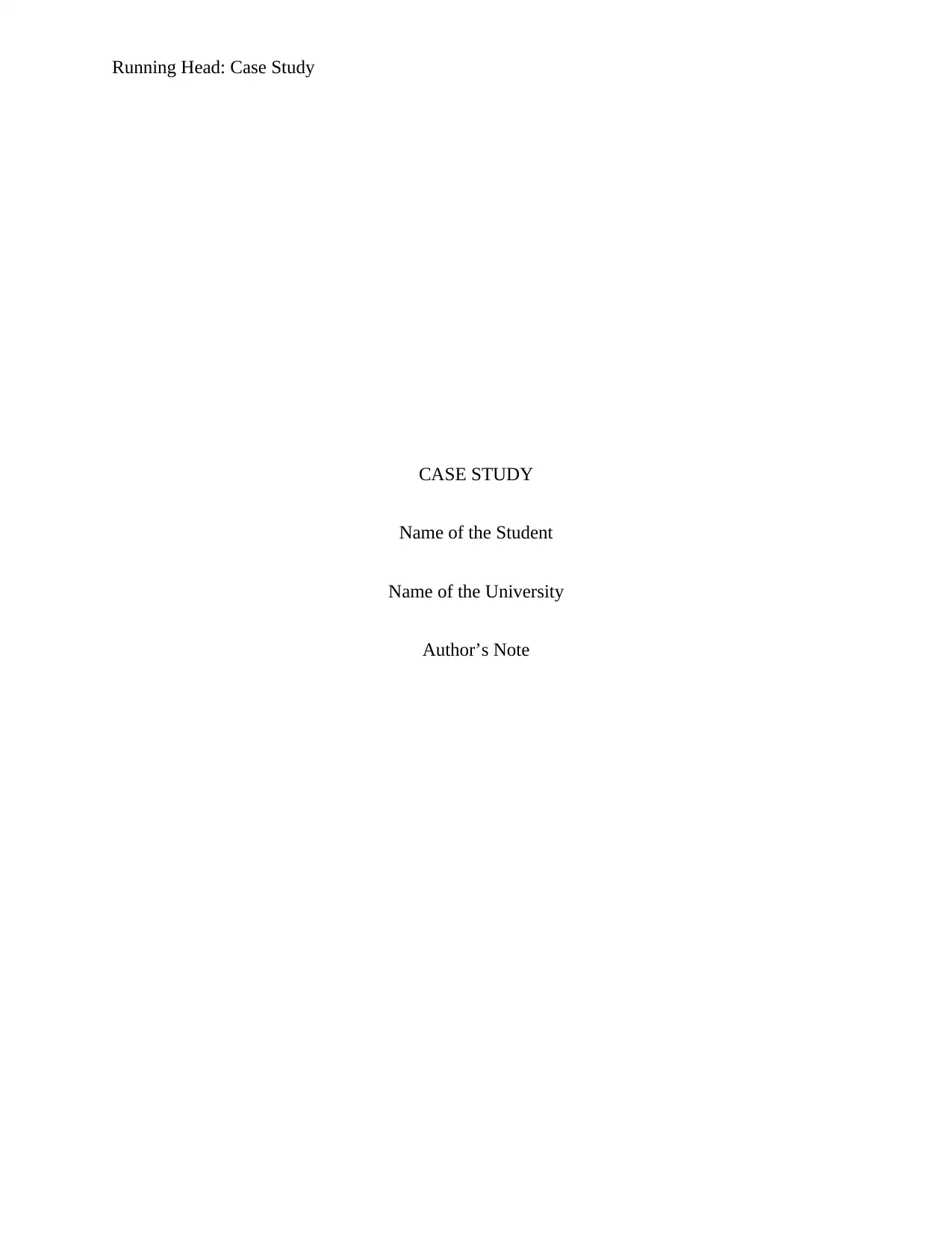
Running Head: Case Study
CASE STUDY
Name of the Student
Name of the University
Author’s Note
CASE STUDY
Name of the Student
Name of the University
Author’s Note
Paraphrase This Document
Need a fresh take? Get an instant paraphrase of this document with our AI Paraphraser
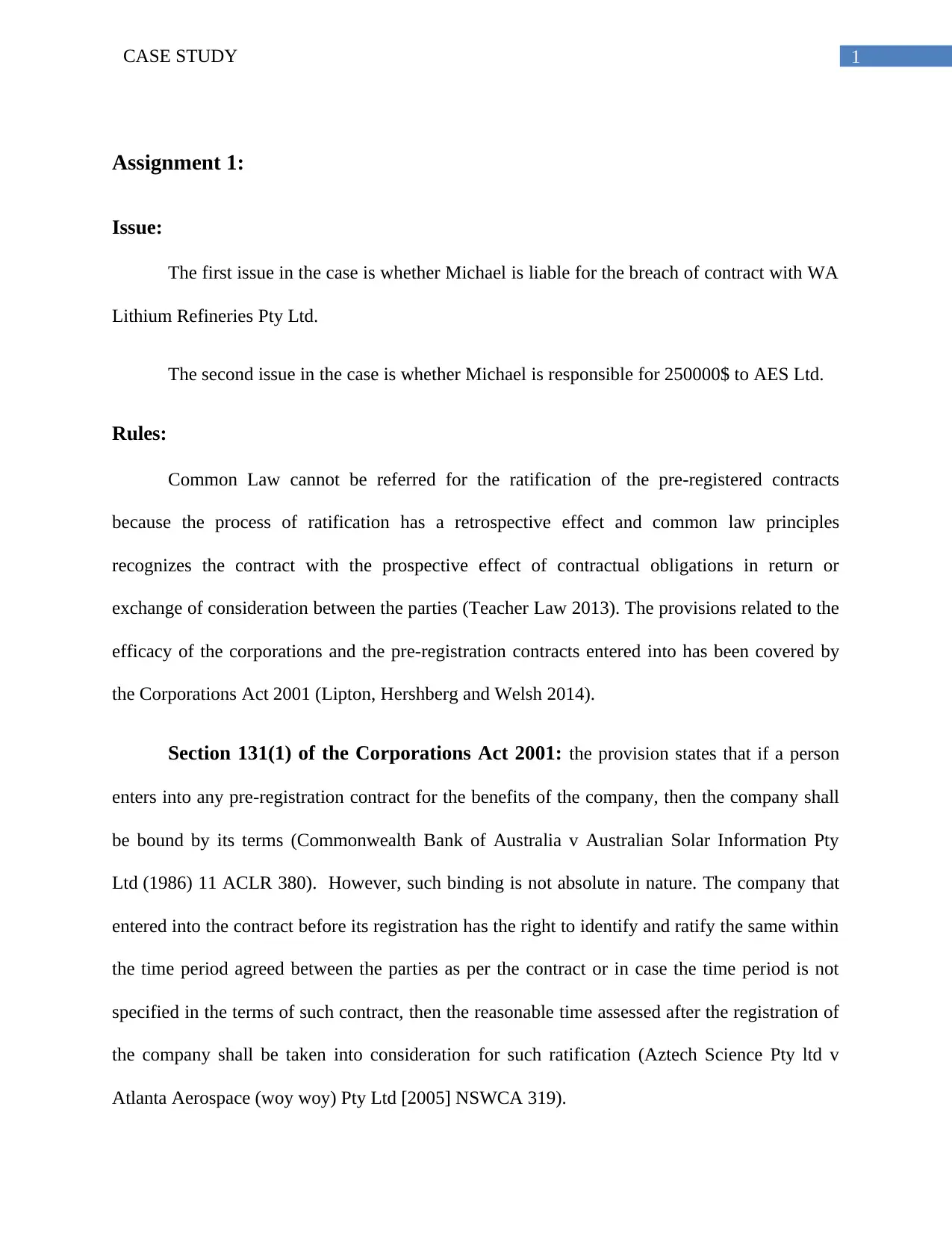
1CASE STUDY
Assignment 1:
Issue:
The first issue in the case is whether Michael is liable for the breach of contract with WA
Lithium Refineries Pty Ltd.
The second issue in the case is whether Michael is responsible for 250000$ to AES Ltd.
Rules:
Common Law cannot be referred for the ratification of the pre-registered contracts
because the process of ratification has a retrospective effect and common law principles
recognizes the contract with the prospective effect of contractual obligations in return or
exchange of consideration between the parties (Teacher Law 2013). The provisions related to the
efficacy of the corporations and the pre-registration contracts entered into has been covered by
the Corporations Act 2001 (Lipton, Hershberg and Welsh 2014).
Section 131(1) of the Corporations Act 2001: the provision states that if a person
enters into any pre-registration contract for the benefits of the company, then the company shall
be bound by its terms (Commonwealth Bank of Australia v Australian Solar Information Pty
Ltd (1986) 11 ACLR 380). However, such binding is not absolute in nature. The company that
entered into the contract before its registration has the right to identify and ratify the same within
the time period agreed between the parties as per the contract or in case the time period is not
specified in the terms of such contract, then the reasonable time assessed after the registration of
the company shall be taken into consideration for such ratification (Aztech Science Pty ltd v
Atlanta Aerospace (woy woy) Pty Ltd [2005] NSWCA 319).
Assignment 1:
Issue:
The first issue in the case is whether Michael is liable for the breach of contract with WA
Lithium Refineries Pty Ltd.
The second issue in the case is whether Michael is responsible for 250000$ to AES Ltd.
Rules:
Common Law cannot be referred for the ratification of the pre-registered contracts
because the process of ratification has a retrospective effect and common law principles
recognizes the contract with the prospective effect of contractual obligations in return or
exchange of consideration between the parties (Teacher Law 2013). The provisions related to the
efficacy of the corporations and the pre-registration contracts entered into has been covered by
the Corporations Act 2001 (Lipton, Hershberg and Welsh 2014).
Section 131(1) of the Corporations Act 2001: the provision states that if a person
enters into any pre-registration contract for the benefits of the company, then the company shall
be bound by its terms (Commonwealth Bank of Australia v Australian Solar Information Pty
Ltd (1986) 11 ACLR 380). However, such binding is not absolute in nature. The company that
entered into the contract before its registration has the right to identify and ratify the same within
the time period agreed between the parties as per the contract or in case the time period is not
specified in the terms of such contract, then the reasonable time assessed after the registration of
the company shall be taken into consideration for such ratification (Aztech Science Pty ltd v
Atlanta Aerospace (woy woy) Pty Ltd [2005] NSWCA 319).
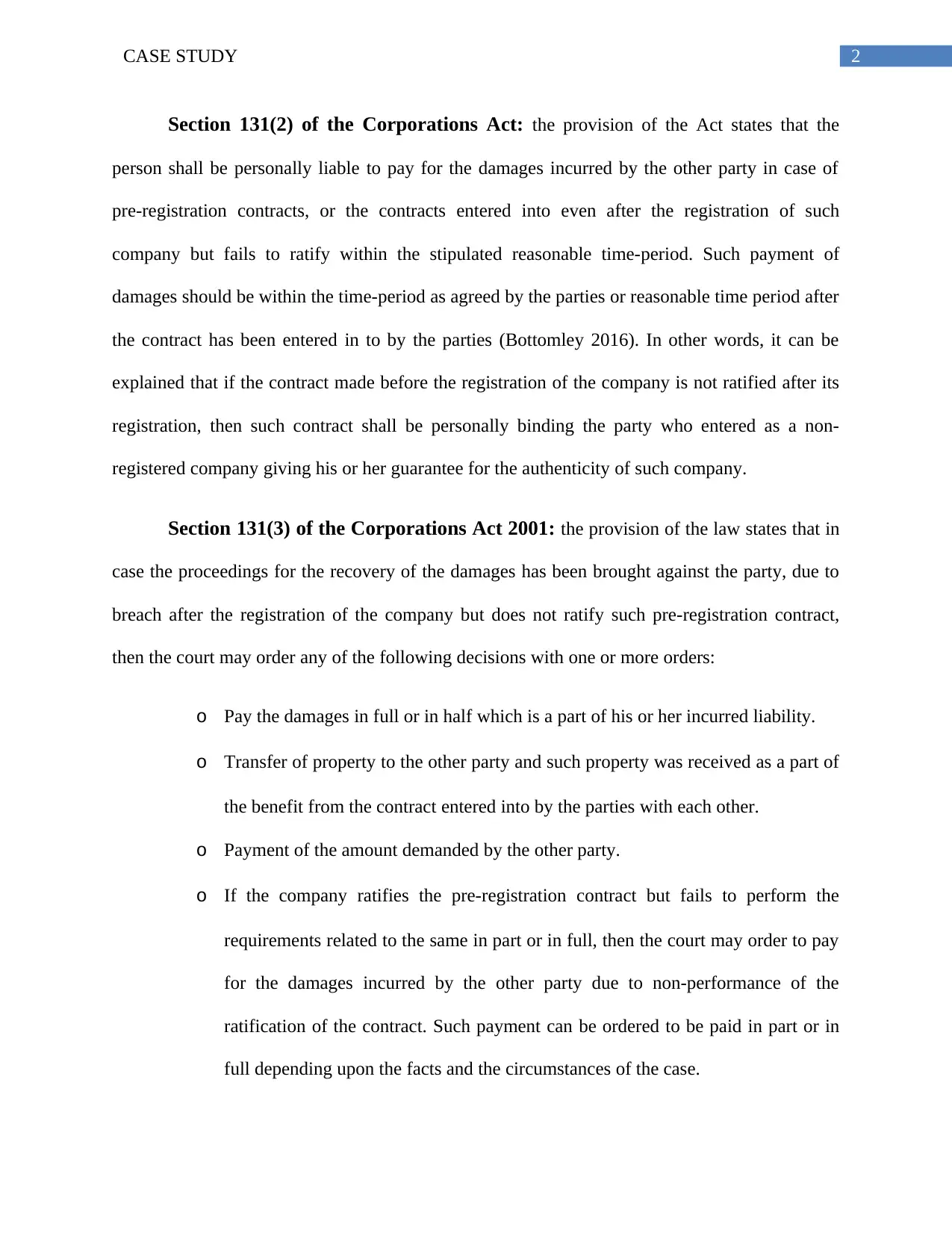
2CASE STUDY
Section 131(2) of the Corporations Act: the provision of the Act states that the
person shall be personally liable to pay for the damages incurred by the other party in case of
pre-registration contracts, or the contracts entered into even after the registration of such
company but fails to ratify within the stipulated reasonable time-period. Such payment of
damages should be within the time-period as agreed by the parties or reasonable time period after
the contract has been entered in to by the parties (Bottomley 2016). In other words, it can be
explained that if the contract made before the registration of the company is not ratified after its
registration, then such contract shall be personally binding the party who entered as a non-
registered company giving his or her guarantee for the authenticity of such company.
Section 131(3) of the Corporations Act 2001: the provision of the law states that in
case the proceedings for the recovery of the damages has been brought against the party, due to
breach after the registration of the company but does not ratify such pre-registration contract,
then the court may order any of the following decisions with one or more orders:
o Pay the damages in full or in half which is a part of his or her incurred liability.
o Transfer of property to the other party and such property was received as a part of
the benefit from the contract entered into by the parties with each other.
o Payment of the amount demanded by the other party.
o If the company ratifies the pre-registration contract but fails to perform the
requirements related to the same in part or in full, then the court may order to pay
for the damages incurred by the other party due to non-performance of the
ratification of the contract. Such payment can be ordered to be paid in part or in
full depending upon the facts and the circumstances of the case.
Section 131(2) of the Corporations Act: the provision of the Act states that the
person shall be personally liable to pay for the damages incurred by the other party in case of
pre-registration contracts, or the contracts entered into even after the registration of such
company but fails to ratify within the stipulated reasonable time-period. Such payment of
damages should be within the time-period as agreed by the parties or reasonable time period after
the contract has been entered in to by the parties (Bottomley 2016). In other words, it can be
explained that if the contract made before the registration of the company is not ratified after its
registration, then such contract shall be personally binding the party who entered as a non-
registered company giving his or her guarantee for the authenticity of such company.
Section 131(3) of the Corporations Act 2001: the provision of the law states that in
case the proceedings for the recovery of the damages has been brought against the party, due to
breach after the registration of the company but does not ratify such pre-registration contract,
then the court may order any of the following decisions with one or more orders:
o Pay the damages in full or in half which is a part of his or her incurred liability.
o Transfer of property to the other party and such property was received as a part of
the benefit from the contract entered into by the parties with each other.
o Payment of the amount demanded by the other party.
o If the company ratifies the pre-registration contract but fails to perform the
requirements related to the same in part or in full, then the court may order to pay
for the damages incurred by the other party due to non-performance of the
ratification of the contract. Such payment can be ordered to be paid in part or in
full depending upon the facts and the circumstances of the case.
⊘ This is a preview!⊘
Do you want full access?
Subscribe today to unlock all pages.

Trusted by 1+ million students worldwide
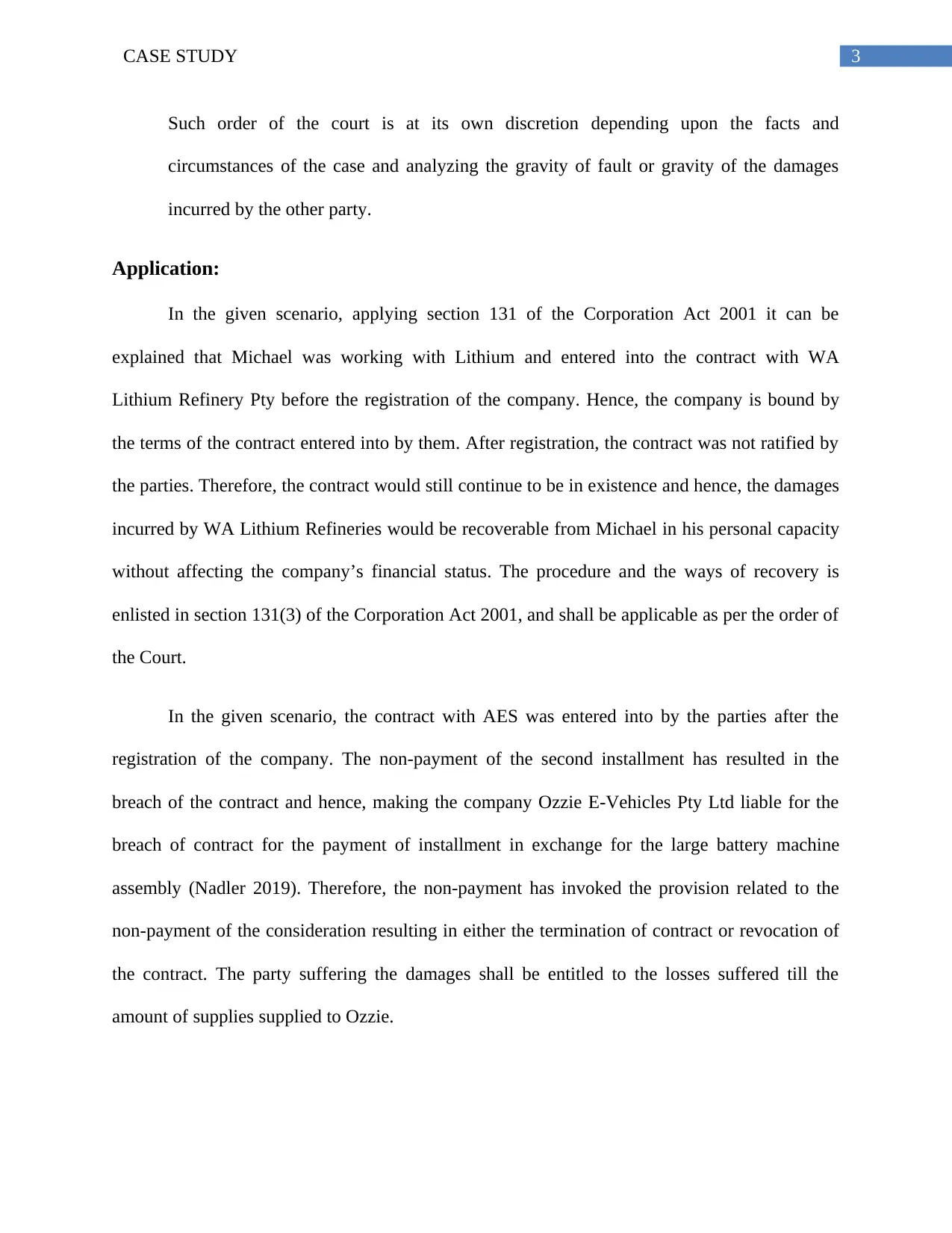
3CASE STUDY
Such order of the court is at its own discretion depending upon the facts and
circumstances of the case and analyzing the gravity of fault or gravity of the damages
incurred by the other party.
Application:
In the given scenario, applying section 131 of the Corporation Act 2001 it can be
explained that Michael was working with Lithium and entered into the contract with WA
Lithium Refinery Pty before the registration of the company. Hence, the company is bound by
the terms of the contract entered into by them. After registration, the contract was not ratified by
the parties. Therefore, the contract would still continue to be in existence and hence, the damages
incurred by WA Lithium Refineries would be recoverable from Michael in his personal capacity
without affecting the company’s financial status. The procedure and the ways of recovery is
enlisted in section 131(3) of the Corporation Act 2001, and shall be applicable as per the order of
the Court.
In the given scenario, the contract with AES was entered into by the parties after the
registration of the company. The non-payment of the second installment has resulted in the
breach of the contract and hence, making the company Ozzie E-Vehicles Pty Ltd liable for the
breach of contract for the payment of installment in exchange for the large battery machine
assembly (Nadler 2019). Therefore, the non-payment has invoked the provision related to the
non-payment of the consideration resulting in either the termination of contract or revocation of
the contract. The party suffering the damages shall be entitled to the losses suffered till the
amount of supplies supplied to Ozzie.
Such order of the court is at its own discretion depending upon the facts and
circumstances of the case and analyzing the gravity of fault or gravity of the damages
incurred by the other party.
Application:
In the given scenario, applying section 131 of the Corporation Act 2001 it can be
explained that Michael was working with Lithium and entered into the contract with WA
Lithium Refinery Pty before the registration of the company. Hence, the company is bound by
the terms of the contract entered into by them. After registration, the contract was not ratified by
the parties. Therefore, the contract would still continue to be in existence and hence, the damages
incurred by WA Lithium Refineries would be recoverable from Michael in his personal capacity
without affecting the company’s financial status. The procedure and the ways of recovery is
enlisted in section 131(3) of the Corporation Act 2001, and shall be applicable as per the order of
the Court.
In the given scenario, the contract with AES was entered into by the parties after the
registration of the company. The non-payment of the second installment has resulted in the
breach of the contract and hence, making the company Ozzie E-Vehicles Pty Ltd liable for the
breach of contract for the payment of installment in exchange for the large battery machine
assembly (Nadler 2019). Therefore, the non-payment has invoked the provision related to the
non-payment of the consideration resulting in either the termination of contract or revocation of
the contract. The party suffering the damages shall be entitled to the losses suffered till the
amount of supplies supplied to Ozzie.
Paraphrase This Document
Need a fresh take? Get an instant paraphrase of this document with our AI Paraphraser
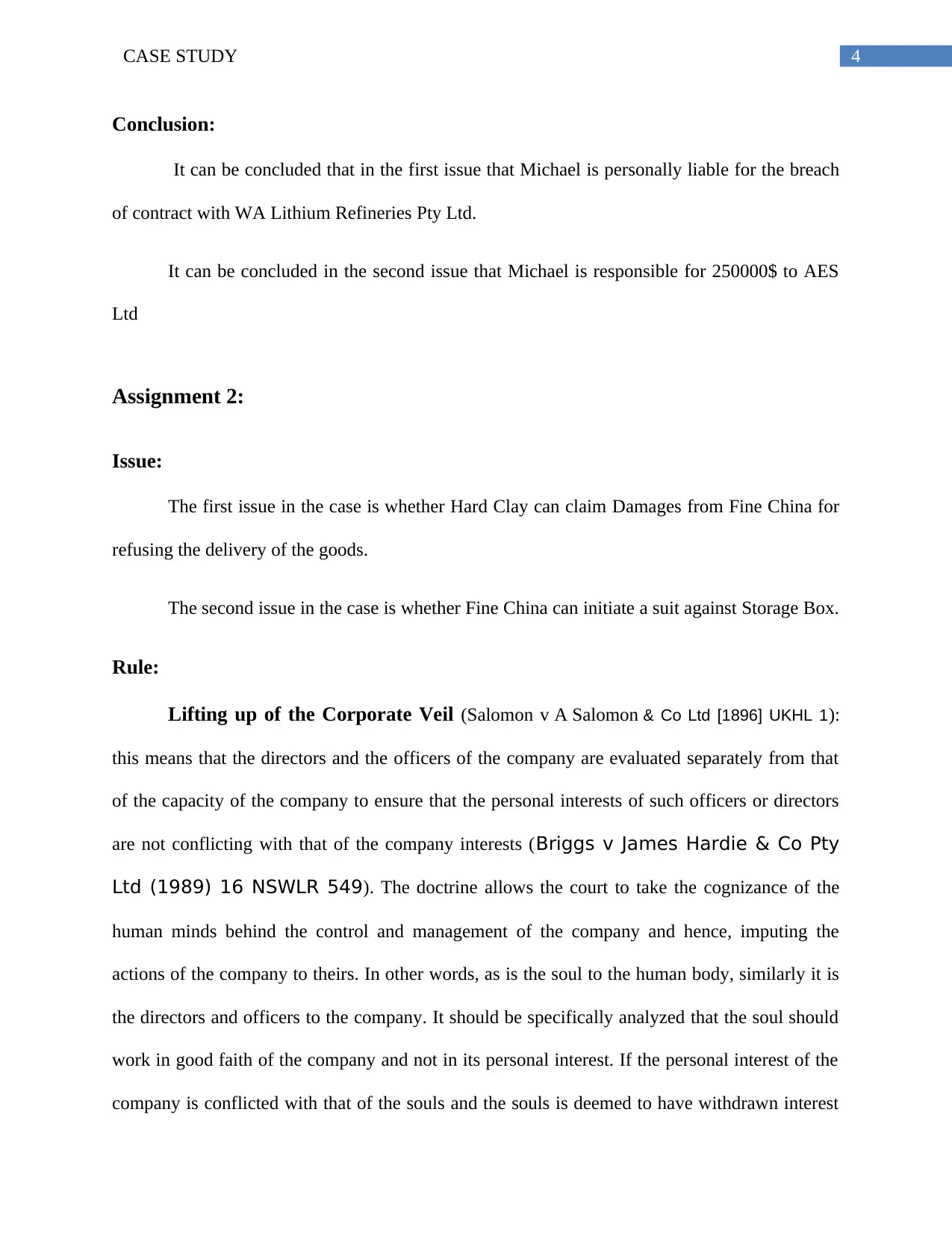
4CASE STUDY
Conclusion:
It can be concluded that in the first issue that Michael is personally liable for the breach
of contract with WA Lithium Refineries Pty Ltd.
It can be concluded in the second issue that Michael is responsible for 250000$ to AES
Ltd
Assignment 2:
Issue:
The first issue in the case is whether Hard Clay can claim Damages from Fine China for
refusing the delivery of the goods.
The second issue in the case is whether Fine China can initiate a suit against Storage Box.
Rule:
Lifting up of the Corporate Veil (Salomon v A Salomon & Co Ltd [1896] UKHL 1):
this means that the directors and the officers of the company are evaluated separately from that
of the capacity of the company to ensure that the personal interests of such officers or directors
are not conflicting with that of the company interests (Briggs v James Hardie & Co Pty
Ltd (1989) 16 NSWLR 549). The doctrine allows the court to take the cognizance of the
human minds behind the control and management of the company and hence, imputing the
actions of the company to theirs. In other words, as is the soul to the human body, similarly it is
the directors and officers to the company. It should be specifically analyzed that the soul should
work in good faith of the company and not in its personal interest. If the personal interest of the
company is conflicted with that of the souls and the souls is deemed to have withdrawn interest
Conclusion:
It can be concluded that in the first issue that Michael is personally liable for the breach
of contract with WA Lithium Refineries Pty Ltd.
It can be concluded in the second issue that Michael is responsible for 250000$ to AES
Ltd
Assignment 2:
Issue:
The first issue in the case is whether Hard Clay can claim Damages from Fine China for
refusing the delivery of the goods.
The second issue in the case is whether Fine China can initiate a suit against Storage Box.
Rule:
Lifting up of the Corporate Veil (Salomon v A Salomon & Co Ltd [1896] UKHL 1):
this means that the directors and the officers of the company are evaluated separately from that
of the capacity of the company to ensure that the personal interests of such officers or directors
are not conflicting with that of the company interests (Briggs v James Hardie & Co Pty
Ltd (1989) 16 NSWLR 549). The doctrine allows the court to take the cognizance of the
human minds behind the control and management of the company and hence, imputing the
actions of the company to theirs. In other words, as is the soul to the human body, similarly it is
the directors and officers to the company. It should be specifically analyzed that the soul should
work in good faith of the company and not in its personal interest. If the personal interest of the
company is conflicted with that of the souls and the souls is deemed to have withdrawn interest
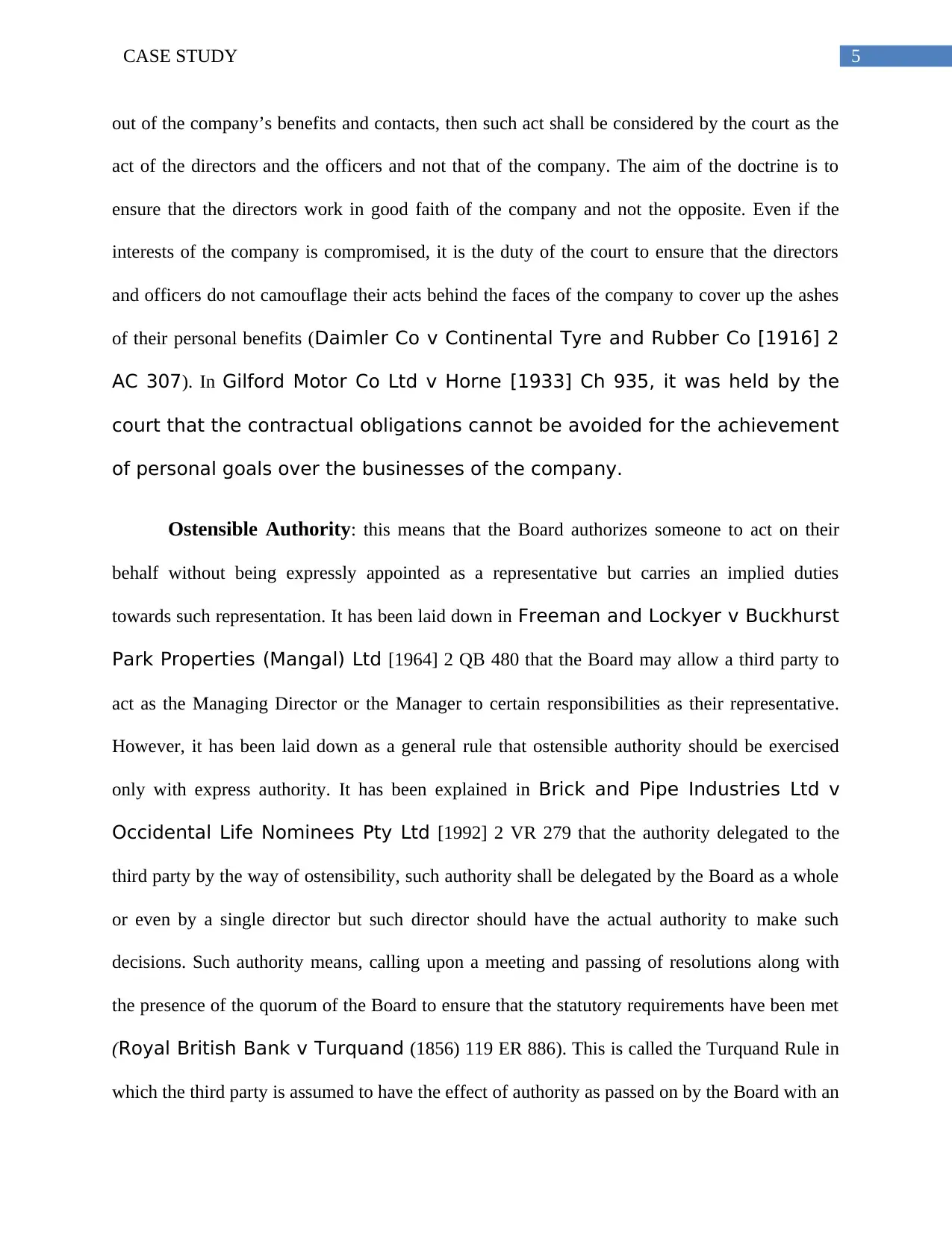
5CASE STUDY
out of the company’s benefits and contacts, then such act shall be considered by the court as the
act of the directors and the officers and not that of the company. The aim of the doctrine is to
ensure that the directors work in good faith of the company and not the opposite. Even if the
interests of the company is compromised, it is the duty of the court to ensure that the directors
and officers do not camouflage their acts behind the faces of the company to cover up the ashes
of their personal benefits (Daimler Co v Continental Tyre and Rubber Co [1916] 2
AC 307). In Gilford Motor Co Ltd v Horne [1933] Ch 935, it was held by the
court that the contractual obligations cannot be avoided for the achievement
of personal goals over the businesses of the company.
Ostensible Authority: this means that the Board authorizes someone to act on their
behalf without being expressly appointed as a representative but carries an implied duties
towards such representation. It has been laid down in Freeman and Lockyer v Buckhurst
Park Properties (Mangal) Ltd [1964] 2 QB 480 that the Board may allow a third party to
act as the Managing Director or the Manager to certain responsibilities as their representative.
However, it has been laid down as a general rule that ostensible authority should be exercised
only with express authority. It has been explained in Brick and Pipe Industries Ltd v
Occidental Life Nominees Pty Ltd [1992] 2 VR 279 that the authority delegated to the
third party by the way of ostensibility, such authority shall be delegated by the Board as a whole
or even by a single director but such director should have the actual authority to make such
decisions. Such authority means, calling upon a meeting and passing of resolutions along with
the presence of the quorum of the Board to ensure that the statutory requirements have been met
(Royal British Bank v Turquand (1856) 119 ER 886). This is called the Turquand Rule in
which the third party is assumed to have the effect of authority as passed on by the Board with an
out of the company’s benefits and contacts, then such act shall be considered by the court as the
act of the directors and the officers and not that of the company. The aim of the doctrine is to
ensure that the directors work in good faith of the company and not the opposite. Even if the
interests of the company is compromised, it is the duty of the court to ensure that the directors
and officers do not camouflage their acts behind the faces of the company to cover up the ashes
of their personal benefits (Daimler Co v Continental Tyre and Rubber Co [1916] 2
AC 307). In Gilford Motor Co Ltd v Horne [1933] Ch 935, it was held by the
court that the contractual obligations cannot be avoided for the achievement
of personal goals over the businesses of the company.
Ostensible Authority: this means that the Board authorizes someone to act on their
behalf without being expressly appointed as a representative but carries an implied duties
towards such representation. It has been laid down in Freeman and Lockyer v Buckhurst
Park Properties (Mangal) Ltd [1964] 2 QB 480 that the Board may allow a third party to
act as the Managing Director or the Manager to certain responsibilities as their representative.
However, it has been laid down as a general rule that ostensible authority should be exercised
only with express authority. It has been explained in Brick and Pipe Industries Ltd v
Occidental Life Nominees Pty Ltd [1992] 2 VR 279 that the authority delegated to the
third party by the way of ostensibility, such authority shall be delegated by the Board as a whole
or even by a single director but such director should have the actual authority to make such
decisions. Such authority means, calling upon a meeting and passing of resolutions along with
the presence of the quorum of the Board to ensure that the statutory requirements have been met
(Royal British Bank v Turquand (1856) 119 ER 886). This is called the Turquand Rule in
which the third party is assumed to have the effect of authority as passed on by the Board with an
⊘ This is a preview!⊘
Do you want full access?
Subscribe today to unlock all pages.

Trusted by 1+ million students worldwide
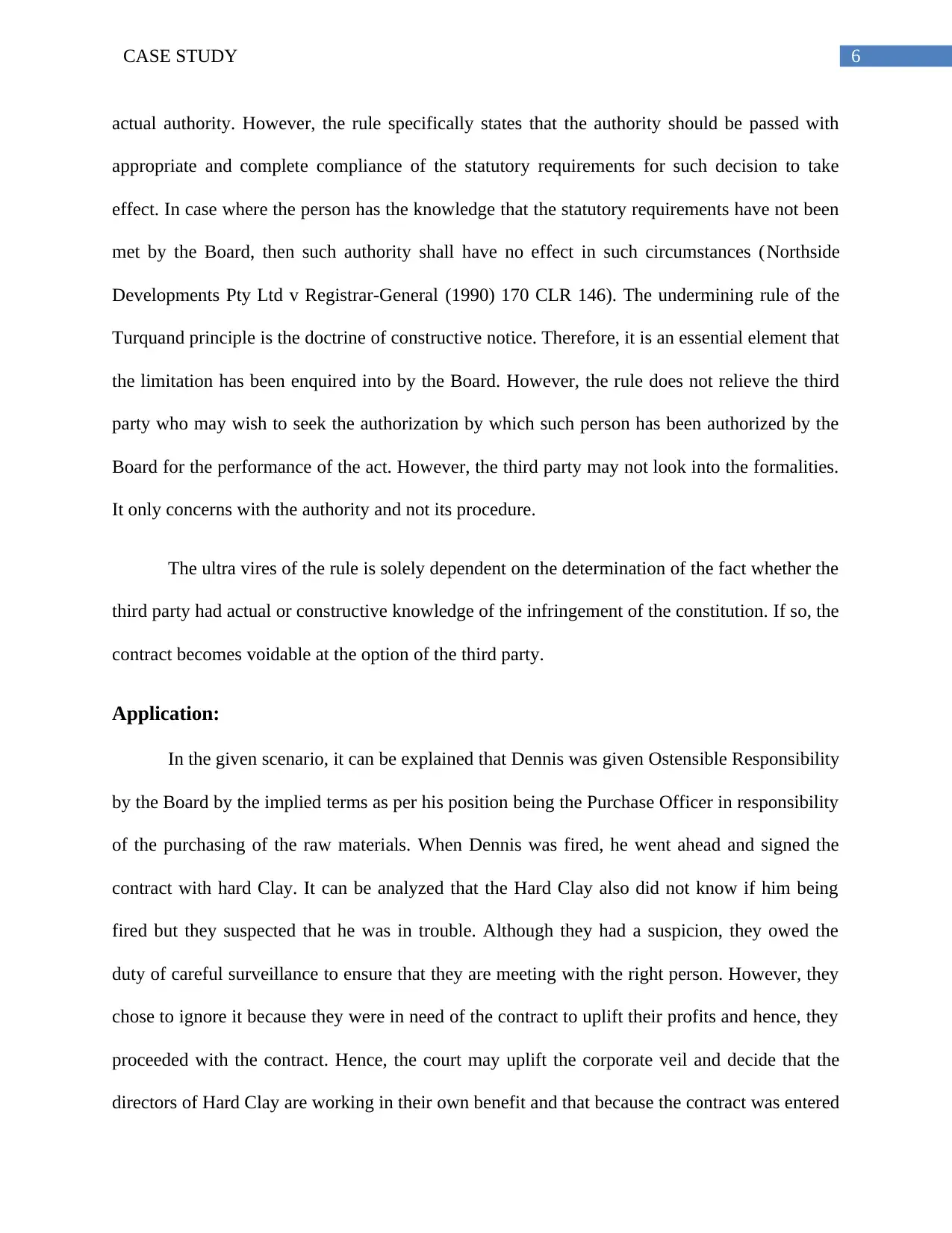
6CASE STUDY
actual authority. However, the rule specifically states that the authority should be passed with
appropriate and complete compliance of the statutory requirements for such decision to take
effect. In case where the person has the knowledge that the statutory requirements have not been
met by the Board, then such authority shall have no effect in such circumstances (Northside
Developments Pty Ltd v Registrar-General (1990) 170 CLR 146). The undermining rule of the
Turquand principle is the doctrine of constructive notice. Therefore, it is an essential element that
the limitation has been enquired into by the Board. However, the rule does not relieve the third
party who may wish to seek the authorization by which such person has been authorized by the
Board for the performance of the act. However, the third party may not look into the formalities.
It only concerns with the authority and not its procedure.
The ultra vires of the rule is solely dependent on the determination of the fact whether the
third party had actual or constructive knowledge of the infringement of the constitution. If so, the
contract becomes voidable at the option of the third party.
Application:
In the given scenario, it can be explained that Dennis was given Ostensible Responsibility
by the Board by the implied terms as per his position being the Purchase Officer in responsibility
of the purchasing of the raw materials. When Dennis was fired, he went ahead and signed the
contract with hard Clay. It can be analyzed that the Hard Clay also did not know if him being
fired but they suspected that he was in trouble. Although they had a suspicion, they owed the
duty of careful surveillance to ensure that they are meeting with the right person. However, they
chose to ignore it because they were in need of the contract to uplift their profits and hence, they
proceeded with the contract. Hence, the court may uplift the corporate veil and decide that the
directors of Hard Clay are working in their own benefit and that because the contract was entered
actual authority. However, the rule specifically states that the authority should be passed with
appropriate and complete compliance of the statutory requirements for such decision to take
effect. In case where the person has the knowledge that the statutory requirements have not been
met by the Board, then such authority shall have no effect in such circumstances (Northside
Developments Pty Ltd v Registrar-General (1990) 170 CLR 146). The undermining rule of the
Turquand principle is the doctrine of constructive notice. Therefore, it is an essential element that
the limitation has been enquired into by the Board. However, the rule does not relieve the third
party who may wish to seek the authorization by which such person has been authorized by the
Board for the performance of the act. However, the third party may not look into the formalities.
It only concerns with the authority and not its procedure.
The ultra vires of the rule is solely dependent on the determination of the fact whether the
third party had actual or constructive knowledge of the infringement of the constitution. If so, the
contract becomes voidable at the option of the third party.
Application:
In the given scenario, it can be explained that Dennis was given Ostensible Responsibility
by the Board by the implied terms as per his position being the Purchase Officer in responsibility
of the purchasing of the raw materials. When Dennis was fired, he went ahead and signed the
contract with hard Clay. It can be analyzed that the Hard Clay also did not know if him being
fired but they suspected that he was in trouble. Although they had a suspicion, they owed the
duty of careful surveillance to ensure that they are meeting with the right person. However, they
chose to ignore it because they were in need of the contract to uplift their profits and hence, they
proceeded with the contract. Hence, the court may uplift the corporate veil and decide that the
directors of Hard Clay are working in their own benefit and that because the contract was entered
Paraphrase This Document
Need a fresh take? Get an instant paraphrase of this document with our AI Paraphraser
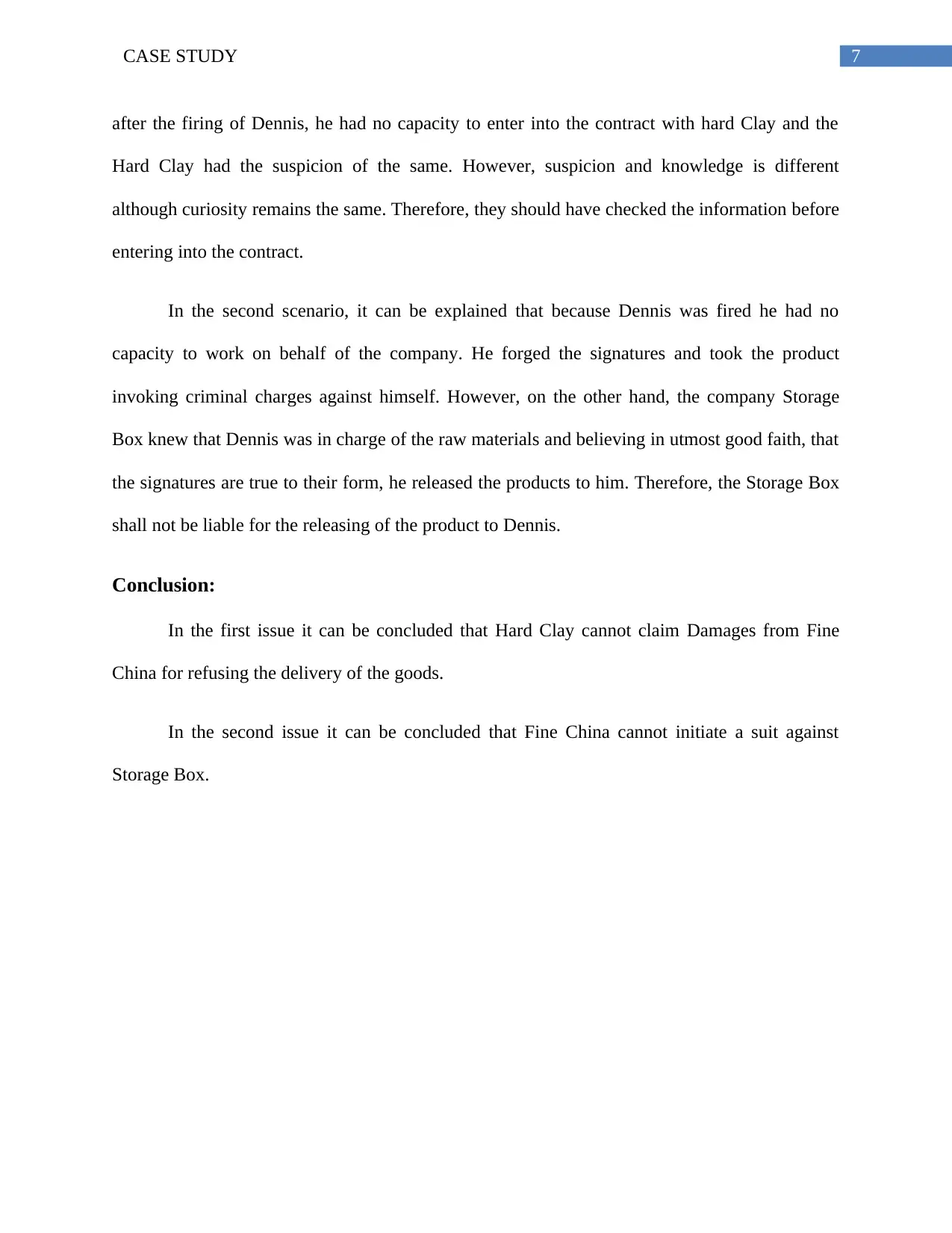
7CASE STUDY
after the firing of Dennis, he had no capacity to enter into the contract with hard Clay and the
Hard Clay had the suspicion of the same. However, suspicion and knowledge is different
although curiosity remains the same. Therefore, they should have checked the information before
entering into the contract.
In the second scenario, it can be explained that because Dennis was fired he had no
capacity to work on behalf of the company. He forged the signatures and took the product
invoking criminal charges against himself. However, on the other hand, the company Storage
Box knew that Dennis was in charge of the raw materials and believing in utmost good faith, that
the signatures are true to their form, he released the products to him. Therefore, the Storage Box
shall not be liable for the releasing of the product to Dennis.
Conclusion:
In the first issue it can be concluded that Hard Clay cannot claim Damages from Fine
China for refusing the delivery of the goods.
In the second issue it can be concluded that Fine China cannot initiate a suit against
Storage Box.
after the firing of Dennis, he had no capacity to enter into the contract with hard Clay and the
Hard Clay had the suspicion of the same. However, suspicion and knowledge is different
although curiosity remains the same. Therefore, they should have checked the information before
entering into the contract.
In the second scenario, it can be explained that because Dennis was fired he had no
capacity to work on behalf of the company. He forged the signatures and took the product
invoking criminal charges against himself. However, on the other hand, the company Storage
Box knew that Dennis was in charge of the raw materials and believing in utmost good faith, that
the signatures are true to their form, he released the products to him. Therefore, the Storage Box
shall not be liable for the releasing of the product to Dennis.
Conclusion:
In the first issue it can be concluded that Hard Clay cannot claim Damages from Fine
China for refusing the delivery of the goods.
In the second issue it can be concluded that Fine China cannot initiate a suit against
Storage Box.
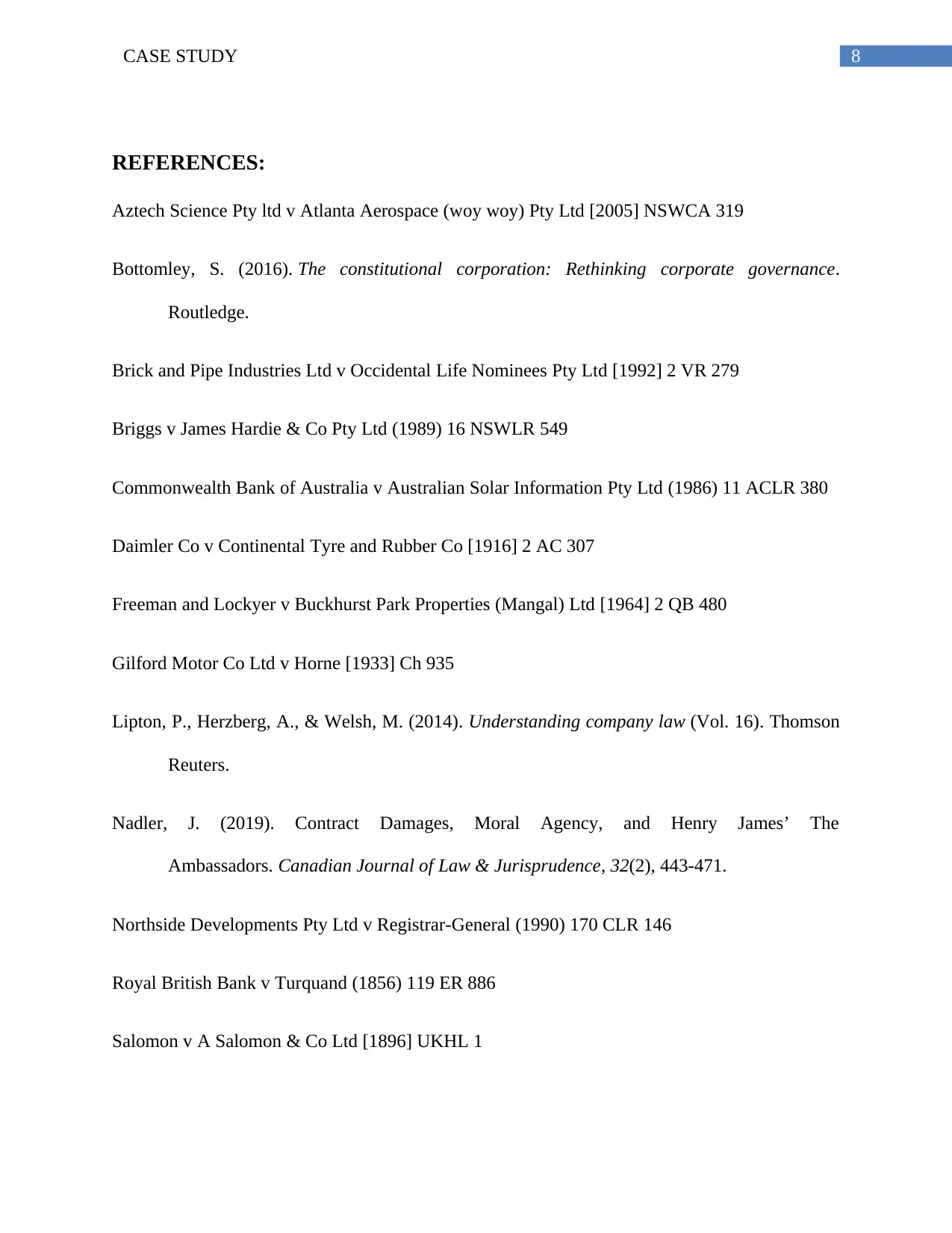
8CASE STUDY
REFERENCES:
Aztech Science Pty ltd v Atlanta Aerospace (woy woy) Pty Ltd [2005] NSWCA 319
Bottomley, S. (2016). The constitutional corporation: Rethinking corporate governance.
Routledge.
Brick and Pipe Industries Ltd v Occidental Life Nominees Pty Ltd [1992] 2 VR 279
Briggs v James Hardie & Co Pty Ltd (1989) 16 NSWLR 549
Commonwealth Bank of Australia v Australian Solar Information Pty Ltd (1986) 11 ACLR 380
Daimler Co v Continental Tyre and Rubber Co [1916] 2 AC 307
Freeman and Lockyer v Buckhurst Park Properties (Mangal) Ltd [1964] 2 QB 480
Gilford Motor Co Ltd v Horne [1933] Ch 935
Lipton, P., Herzberg, A., & Welsh, M. (2014). Understanding company law (Vol. 16). Thomson
Reuters.
Nadler, J. (2019). Contract Damages, Moral Agency, and Henry James’ The
Ambassadors. Canadian Journal of Law & Jurisprudence, 32(2), 443-471.
Northside Developments Pty Ltd v Registrar-General (1990) 170 CLR 146
Royal British Bank v Turquand (1856) 119 ER 886
Salomon v A Salomon & Co Ltd [1896] UKHL 1
REFERENCES:
Aztech Science Pty ltd v Atlanta Aerospace (woy woy) Pty Ltd [2005] NSWCA 319
Bottomley, S. (2016). The constitutional corporation: Rethinking corporate governance.
Routledge.
Brick and Pipe Industries Ltd v Occidental Life Nominees Pty Ltd [1992] 2 VR 279
Briggs v James Hardie & Co Pty Ltd (1989) 16 NSWLR 549
Commonwealth Bank of Australia v Australian Solar Information Pty Ltd (1986) 11 ACLR 380
Daimler Co v Continental Tyre and Rubber Co [1916] 2 AC 307
Freeman and Lockyer v Buckhurst Park Properties (Mangal) Ltd [1964] 2 QB 480
Gilford Motor Co Ltd v Horne [1933] Ch 935
Lipton, P., Herzberg, A., & Welsh, M. (2014). Understanding company law (Vol. 16). Thomson
Reuters.
Nadler, J. (2019). Contract Damages, Moral Agency, and Henry James’ The
Ambassadors. Canadian Journal of Law & Jurisprudence, 32(2), 443-471.
Northside Developments Pty Ltd v Registrar-General (1990) 170 CLR 146
Royal British Bank v Turquand (1856) 119 ER 886
Salomon v A Salomon & Co Ltd [1896] UKHL 1
⊘ This is a preview!⊘
Do you want full access?
Subscribe today to unlock all pages.

Trusted by 1+ million students worldwide

9CASE STUDY
Teacher, Law. (November 2013). Common Law Discuss That the Pre-Registration Contract.
Retrieved from https://www.lawteacher.net/free-law-essays/company-law/common-law-
discuss-that-the-pre-registration-contract-company-law-essay.php?vref=1
Teacher, Law. (November 2013). Common Law Discuss That the Pre-Registration Contract.
Retrieved from https://www.lawteacher.net/free-law-essays/company-law/common-law-
discuss-that-the-pre-registration-contract-company-law-essay.php?vref=1
1 out of 10
Related Documents
Your All-in-One AI-Powered Toolkit for Academic Success.
+13062052269
info@desklib.com
Available 24*7 on WhatsApp / Email
![[object Object]](/_next/static/media/star-bottom.7253800d.svg)
Unlock your academic potential
Copyright © 2020–2025 A2Z Services. All Rights Reserved. Developed and managed by ZUCOL.





